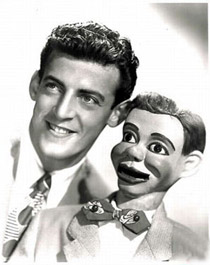Paul Winchell - an interesting bit of history
We all know that the voice of Tigger (Paul Winchell) passed away recently. What was news to me was that Paul had an idea for an artificial heart and patented the first one.

Medgaget has this
curious bit of history:
They link to a quote from his autobiography:
Winchell is one of those rare people whose diverse talents repeatedly led him to the crossroads of history and celebrity. His autobiography is full of supporting anecdotes. For instance, his dance moves once beat Ricardo Moltalban's at a televised competition, which led to a dinner party invitation. At that meal, he was introduced to Dr. Henry Heimlich, who would soon be known for a fancy maneuver of his own. Heimlich invited Winchell into his OR at Montefiore, and on one visit Winchell had the brainstorm for the artificial heart:
... My work in TV was to make people laugh but the "miracles" I had just witnessed made me feel that I was living at both ends of the spectrum. I took advantage of Hank's offer, visiting often and gradually he became my best friend.
Early one morning, I watched a sad George Robinson lose a patient during open-heart surgery and an idea struck me that sent me running to Heimlich. "Hank", I began excitedly, "I just watched poor George lose his patient and I got to wondering if an artificial heart with its own power source were available, could it keep a patient alive during a crucial period?" He looked at me and smiled. "You'd make a good physician Paul", he said. "You build your own dummies, so why don't you make a model of your idea and if you need my input, I'd be glad to help". All I needed to hear was that my thinking wasn't too far out and I went right to work constructing a model.
Medgaget then quotes a bit more:
Odd as it may seem, the heart wasn't that different from building a dummy; the valves and chambers were not unlike the moving and eyes and closing mouth of a puppet. Yes, meeting Heimlich at the Murrays had set me off on a path that I could never have anticipated. For months I worked and reworked the model, running to Hank for advice each time I got stuck. True to his word, he was always available with suggestions for corrections and improvements. Not being very conversant with the dynamics of cardiac function, I overlooked several vital circulatory issues and each time, Hank put me back on track. At last, after examining all the changes, Hank looked at me and said very simply, "If this were my idea I would get it patented." I could scarcely believe my ears. After all the many months of trial and error, his encouragement sent me straight to my patent attorney's office where I applied for a patent and then I awaited the examiner's report. The initial search revealed that the device was cleared for patent and no prior art had been found. I filed in the summer of 1956.
And the end result:
I returned again to Utah when I heard rumblings that the FDA was considering trying the technology on a human being. I met a young man there who had been hired to adapt the invention for human physiology. His name was Robert Jarvik, a brilliant biomedical engineer who had begun to modify the heart for a human being. Until then my patent had been used primarily for animal studies and was much too large for the human chest. By the time Jarvik had reduced the unit, a brave dentist named Barney Clark volunteered to be the first recipient of an artificial heart. I continued to make suggestions to Kolf because my patent had called for rechargeable batteries to power the unit but Kolff preferred compressed air, which I still believe is impractical. As the project drew near I began to perceive a change of attitude towards me and correspondence from Kolff began to dwindle.
One day I received a call from Merv Griffin asking me to appear on his talk show with Dr. Christiaan Barnard, the first cardiac surgeon to do a human heart transplant, and discuss the pros and cons of live heart transplant versus artificial ones. It turned out to be one of the most emotional programs in which I had ever participated. As Chris Barnard and I sat being interviewed by Merv, millions of viewers saw a rare moment of TV history. As Dr. Barnard was relating an incident in which he was operating upon a dear friend, he revealed that his patient expired on the table. "Paul" he said to me, "If I'd had a devise like yours at the time my friend might have survived". Then he stopped talking and began to sob...
Very cool... We knew about Heddy Lamarr having the patent for
Spread Spectrum communications. What other technology is lurking out there in Holywood...
Posted by DaveH at July 3, 2005 3:46 PM
